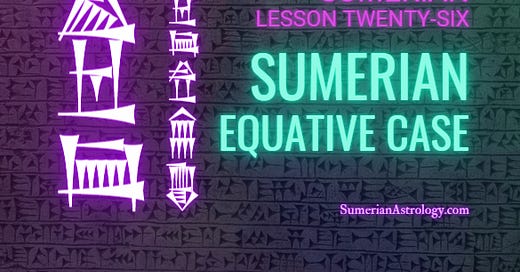Go Back to Lesson 25: Sumerian Ordinal Numbers
Introduction
In this lesson, you’ll learn all about the Sumerian equative case. Because it’s so easy to learn, we’ll also be taking the opportunity to review some Sumerian pronouns! Let’s jump in!
Helpful Terms
equative: a grammatical case which indicates similarity or equality, as in “like,” or “as”, as well as replacement, as in “instead of”; marked by gin7 𒁶.
Vocabulary
a-a 𒀀𒀀 n., father.
a-ba 𒀀𒁀 pron., inter., who? (OS x2, OA x3, NS x20, OB x308).
ama 𒂼 n., mother.
a-ne 𒀀𒉈 pron., ind., he/she (OS x7, NS x9, OB x20).
a-ne-ne 𒀀𒉈𒉈 pron., ind., he/she (OS x1, OB x3). part., suff., poss., (a)ne-ne (𒂊)𒉈𒉈 their (pers.) (abs., erg., dir., gen.) (with a 𒀀 (loc.)) (with ra/er 𒊏/𒅕 (dat.)) (with da/ta/šè/gin7 𒁕/𒋫/𒂠/𒄀 (com., abl., term., equ.)) (earlier periods).
babbar 𒌓 adj., bright; white. v., to be bright; white.
bi (bé) 𒁉 pron., dem., this, that (similar to ‘the’) (x261) (ba 𒁀 gen.). part., part., suff., poss., its/their (impers.) (with ra/ir 𒊏/𒅕 (dat.)) (with šè/iš 𒂠/𒅖 (term.)).
diĝir 𒀭 n., god, deity. det., indicates the name of a deity (abbr. d).
dumu 𒌉 n., child, son, daughter.
ga 𒂵 n., milk. v., to bring, carry. part., pref., cohortative prefix meaning ‘let me/I shall’. part., suff., nominalizing suffix when preceded by /g/.
gen7 (gim, gin7) 𒁶 part., suff., like, as, just as; instead of; during (equat.); alternative reading of gin7.
gim (gin7, gen7) 𒁶 part., suff., like, as, just as; instead of; during (equat.); alternative reading of gin7 .
gin7 (gim, gen7) 𒁶 part., suff., like, as, just as; instead of; during (equat.).
gud (gu4) 𒄞 n., bull; ox; cattle.
ĝá-e 𒂷𒂊 pron., ind., I (OS, OA, NS, OB).
ĝu10 𒈬 pron., poss., my (abs., erg., dir.) (with ra/úr 𒊏/𒌫 (dat.)) (with šè/uš 𒂠/𒍑 (term.)) (with da/ta/gin7 𒁕/𒋫/𒄀 (com., abl., equ.)) (with um 𒌝 before the enclitic copula).
lú 𒇽 n., man, male; human, person.
lugal 𒈗 n., king; owner, master, lord.
me 𒈨 n., function, office, responsibility; divine power/decree. part., suff., poss., our (abs., erg., dir., gen.,) (with a 𒀀 (loc.)) ra/da/ta/šè/gin7 (dat., com., abl., equ.,)) cop., I am (OS), you are (OS, NS), they are (NS). v., to say, tell. adv., where?
me-en 𒈨𒂗 cop., I am, you are (sg.).
me-éš 𒈨𒂠 cop., they are (NS).
mul 𒀯 n., celestial body, star, planet, constellation, meteor; arrow. det., indicates a celestial body or constellation.
nam 𒉆 pron., inter., what? (OB x17). mut., variation of /n/ + àm.
nin 𒎏 n., lady, mistress, owner, queen; lord (sometimes found in male names).
šeš 𒋀 n., brother; colleague; assistant.
ur-maḫ 𒌨𒈤 n., lion.
za-e 𒍝𒂊 pron., ind., you (especially in conjunction with a copula) (may be transliterated/read as ze 𒍣 (OB x 11), or ze4-e 𒍝𒂊) (NS x1, OB x419).
zu 𒍪 n., knowledge, wisdom. v., to know; learn, discover; teach (m. zu-zu 𒍪𒍪); be experienced. part., suff., poss., your (sg.) (abs., erg., dir.) (with da/ta/gin7 𒁕/𒋫/𒄀 (com., abl., equ.).
zu-ne-ne 𒍪𒉈𒉈 part., suff., poss., your (pl.) (abs., erg., dir., gen.) (with ra/ur 𒊏/𒌫 (dat.)) (with šè/uš 𒂠/𒍑 (term.)) (with a 𒀀 (loc.)) (with da/ta/šè/gin7 𒁕/𒋫/𒂠/𒄀 (com., abl., term., equ.)) (with um 𒌝 before the enclitic copula).
The Sumerian Equative Case
The Sumerian equative case is perhaps the easiest to learn. It’s as simple as suffixing -gin7 𒁶 to the noun you’d like to show relationship to, as in:
lugal-gin7 𒈗𒁶 like a king
ama-ĝu10-gin7 𒂼𒈬𒁶 like my mother
a-ba za-e-gin7 𒀀𒁀𒍝𒂊𒁶 who is like you?
NOTE: The equative case is marked by the GIM sign 𒁶. While it was read as /gim/ in the early days of Sumerologocal literature, gin7 is currently the most accepted reading, followed by gen7, and variations of gi(n) and ge(n).
The Sumerian Equative Case Using Sumerian Personal and Possessive Pronouns
The following are some examples of the Sumerian equative case using various pronouns, which should serve as a refresher, and get your eyes ready to read the long sentences so common to Sumerian literature!
With Personal Pronouns
ĝá-e ur-maḫ-gin7 me-en 𒂷𒂊𒌨𒈤𒁶𒈨𒂗 It is I who am like a lion.
za-e a-a-ĝu10-gin7 me-en 𒍝𒂊𒀀𒀀𒈬𒁶𒈨𒂗 It is you who are like my father.
a-ne nin-gin7-nam 𒀀𒉈𒎏𒁶𒉆 It is she who is like a queen.
With Possessive Personal Pronouns
šeš-ĝu10-gin7-nam 𒋀𒈬𒁶𒉆 He is like my brother.
lú a-a-zu gin7-nam 𒇽𒀀𒀀𒍪𒁶𒉆 The man is like your father.
ama-ne-gin7-nam 𒂼𒉈𒁶𒉆 She is like her mother.
babbar ga-bi-gin7-nam 𒌓𒂵𒁉𒁶𒉆 It is white like its milk.
dumu-me-gin7-me-éš 𒌉𒈨𒁶𒈨𒂠 They are like our children.
mul-mul gud-zu-ne-ne-gin7-me 𒀯𒀯𒄞𒍪𒉈𒉈𒁶𒈨 The stars, they are like your (pl.) cattle.
lugal-lugal diĝir-a-ne-ne-gin7-me-éš 𒈗𒈗𒀭𒉈𒉈𒀀𒁶𒈨𒂠 The kings are like thier gods.
Your Sumerian Language Journey Continues
In the next lesson, you’ll learn about the Sumerian absolutive case, which is arguably just as easy as the Sumerian equative case, so be sure to subscribe!
Jump to Lesson 27: the Sumerian Absolutive Case
My Links
📃 Sumerian and Astrology Resources
🧘♀️ Join My FREE Meditation Support Group



